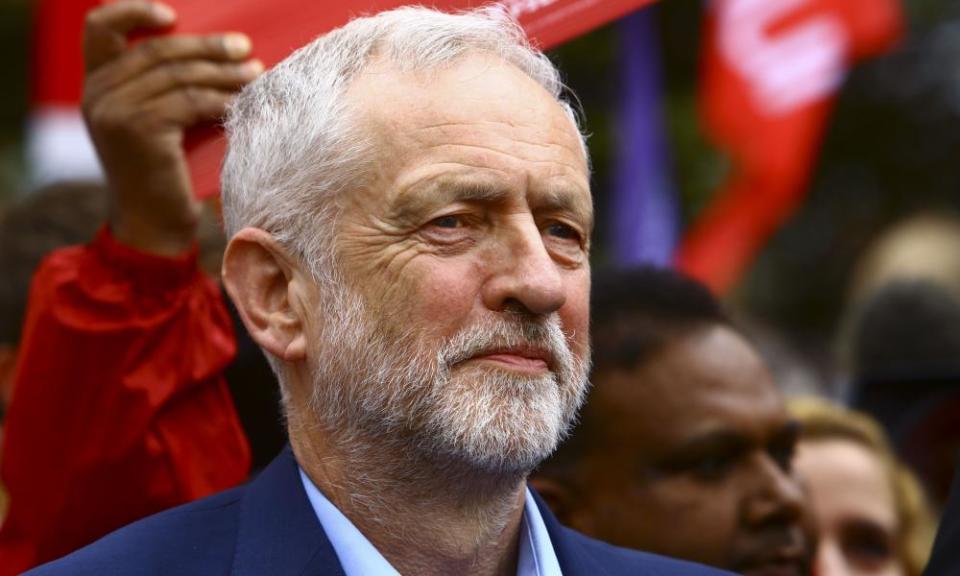Jeremy Corbyn vows to 'fight every seat in every corner' of Scotland

Jeremy Corbyn will take his upbeat campaign message to Scotland on Monday, promising to “fight for every seat in every corner of these isles”.
Labour has just one MP at Westminster representing a Scottish constituency, Edinburgh South, after the party’s vote in the north collapsed in 2015.
But while his party lags behind the Conservatives by more than 20 points in the polls, Corbyn will tell the Scottish TUC in Aviemore that he relishes the challenge of the snap election and is “in it to win it”. He will also outline the party’s policies, including a requirement for firms bidding for government contracts to recognise unions and an increase in the minimum wage to £10 an hour by 2020.
Corbyn’s speech comes as his party scrambles to finalise a fully-costed manifesto. While a series of headline policies have been announced in recent weeks, Labour members received an email on Sunday asking them to give their views on what policies should be included. The consultation doesn’t close until 2 May, and the Guardian understands that the Clause V committee – the key party grouping which must sign off the plans – is not expected to meet until 11 May.
Corbyn’s team are keen for Labour’s campaign to be livelier than Theresa May’s tightly-controlled strategy, and hope to benefit from what they regard as his authenticity.
But the risks of that approach were underlined on Sunday when they were forced to move hastily to shut down speculation that Labour could withdraw support for Britain’s nuclear deterrent, after Corbyn appeared to leave open the idea that renewing Trident could be left out of the party’s manifesto.
In an interview on BBC1’s The Andrew Marr Show, Corbyn, who has been a longstanding campaigner against nuclear proliferation, said he did not believe maintaining Trident would make the UK safer.
“The issue has to be that we want a secure and peaceful world,” Corbyn said. “You achieve that by promoting peace and also promoting security. Security comes from that process.”
He said a Labour government would hold an immediate defence review, adding: “We haven’t completed work on the manifesto ... We are less than 100 hours into this election campaign. We are having this discussion within the Labour party.”
Shortly afterwards, as speculation mounted that Labour could be set to dump its backing for the nuclear deterrent – an issue Labour MPs are deeply divided about – a spokesperson issued a statement saying: “The decision to renew Trident has been taken and Labour supports that.”
“We also want Britain to do much more to pursue a proactive, multilateral disarmament strategy,” he added.
It was the second time since Theresa May announced the snap election that Labour has had to clarify its position on key campaign issues.
At the party’s campaign launch event on Thursday, both Corbyn and the shadow chancellor, John McDonnell, appeared to refuse to rule out backing a referendum on the final Brexit deal. But Labour later issued a statement saying a second referendum would not be in the manifesto.
Corbyn was also pressed by Andrew Marr on his approach to the use of nuclear weapons. New prime ministers are asked to write “letters of last resort” on their first day in office, which are sealed and given to captains of the UK’s nuclear submarines in the event that the government is wiped out by a nuclear strike.
Asked whether, as prime minister, he would instruct a retaliation in his letter, Corbyn said: “I have made clear there would be no first use of it. I’ve made clear any use of nuclear weapons would be a disaster for the whole world.
“Nuclear weapons are not the solution to the world’s security issues. They are a disaster if ever used.”
He also said he would be cautious about acting on military intelligence if he were ever asked to authorise a drone strike on the Islamic State leader, Abu Bakr al-Baghdadi. “What is the objective? To have more strikes that would kill more possibly innocent people, or to get a political solution in Syria?” Corbyn asked.
“Does this help to get a political solution? I think the leader of Isis not being around would be helpful, but I would also argue that the bombing campaign has killed a large number of civilians, many of them virtual prisoners of Isis.”
The home secretary, Amber Rudd, said the comments made it clear Corbyn would “refuse to strike against terrorists, dismantle our nuclear defences and fail to control our borders”.

 Yahoo News
Yahoo News 